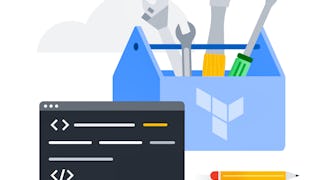- Browse
- Software Security
Results for "software security"
 Status: PreviewPreviewU
Status: PreviewPreviewUUiPath
Skills you'll gain: Robotic Process Automation, Web Scraping, Business Process Automation, Automation, Data Import/Export, Microsoft Excel, Computing Platforms, Workflow Management, User Interface (UI)
4·Rating, 4 out of 5 stars10 reviewsBeginner · Course · 1 - 4 Weeks
 Status: PreviewPreview
Status: PreviewPreviewSkills you'll gain: Information Privacy, Data Governance, Law, Regulation, and Compliance, Personally Identifiable Information, General Data Protection Regulation (GDPR), Data Security, Data Management, Data Architecture, Data Strategy, Data Ethics, Metadata Management, Encryption
4.5·Rating, 4.5 out of 5 stars49 reviewsMixed · Course · 1 - 3 Months
 Status: Free TrialFree TrialG
Status: Free TrialFree TrialGGoogle Cloud
Skills you'll gain: Gemini, Generative AI, Google Cloud Platform, Cloud Applications, Software Development Tools, Application Development, Integrated Development Environments, Code Review
4.5·Rating, 4.5 out of 5 stars15 reviewsBeginner · Course · 1 - 4 Weeks
 Status: Free TrialFree TrialE
Status: Free TrialFree TrialEEpic Games
Skills you'll gain: Game Design, Video Game Development, Prototyping, Unreal Engine, Animation and Game Design, Virtual Reality, System Design and Implementation, Augmented and Virtual Reality (AR/VR), Creativity, User Interface (UI), UI Components
4·Rating, 4 out of 5 stars20 reviewsBeginner · Course · 1 - 4 Weeks
 Status: Free TrialFree TrialR
Status: Free TrialFree TrialRRice University
Skills you'll gain: Probability & Statistics, Microsoft Excel, Descriptive Statistics, Business Analytics, Box Plots, Probability Distribution, Data Visualization, Probability, Statistics, Business Mathematics, Spreadsheet Software, Data-Driven Decision-Making, Algebra, Bayesian Statistics, Arithmetic, Case Studies, Statistical Analysis, Quantitative Research, Data Analysis, Correlation Analysis
4.6·Rating, 4.6 out of 5 stars17 reviewsBeginner · Course · 1 - 3 Months
 Status: PreviewPreviewG
Status: PreviewPreviewGGoogle Cloud
Skills you'll gain: Infrastructure as Code (IaC), Terraform, Google Cloud Platform, Cloud Infrastructure, Cloud Storage, Configuration Management
4.7·Rating, 4.7 out of 5 stars59 reviewsBeginner · Course · 1 - 3 Months
 Status: Free TrialFree TrialL
Status: Free TrialFree TrialLLearnKartS
Skills you'll gain: Apache Kafka, Server Administration
4·Rating, 4 out of 5 stars39 reviewsIntermediate · Course · 1 - 4 Weeks
 Status: Free TrialFree Trial
Status: Free TrialFree TrialSkills you'll gain: Power BI, Dashboard, Business Intelligence, Data Presentation, Data Storytelling, Data Visualization Software, Data Transformation, Data Analysis Expressions (DAX), Business Analytics, Data Modeling, Star Schema, Data-Driven Decision-Making, Pivot Tables And Charts, Key Performance Indicators (KPIs), Interactive Data Visualization, Microsoft Power Platform, Microsoft Excel, Data Management, Data Analysis, Advanced Analytics
4.3·Rating, 4.3 out of 5 stars23 reviewsIntermediate · Specialization · 1 - 3 Months
 C
CCoursera
Skills you'll gain: Content Performance Analysis, Drive Engagement, Content Strategy, Web Analytics, Social Media Content, Customer Engagement, Content Creation, Strategic Communication, Branding, Marketing Analytics, Media Strategy, Social Media Strategy, Social Media, Marketing Channel, Video Production, Digital Marketing
4.5·Rating, 4.5 out of 5 stars82 reviewsBeginner · Guided Project · Less Than 2 Hours
 Status: Free TrialFree Trial
Status: Free TrialFree TrialSkills you'll gain: System Programming, Hardware Architecture, Embedded Systems, Computer Architecture, System Configuration, Debugging, Application Development
4.7·Rating, 4.7 out of 5 stars51 reviewsIntermediate · Course · 1 - 3 Months
 Status: Free TrialFree TrialU
Status: Free TrialFree TrialUUniversity of California, Irvine
Skills you'll gain: Stakeholder Management, Communication Planning, Agile Project Management, Work Breakdown Structure, Project Scoping, Project Management, Project Schedules, Project Coordination, Project Planning, Leadership and Management, Leadership, Feasibility Studies, Requirements Analysis, Communication
4.6·Rating, 4.6 out of 5 stars18 reviewsBeginner · Course · 1 - 3 Months
 Status: Free TrialFree TrialB
Status: Free TrialFree TrialBBoard Infinity
Skills you'll gain: Blockchain, User Interface and User Experience (UI/UX) Design, Cryptography, Secure Coding, Application Security, Web Development Tools, React Redux, Encryption, User Experience Design, Key Management, Application Design, Cryptographic Protocols, Application Development, Web Applications, Software Development Tools, Legal Technology, Vulnerability Assessments, Frontend Integration, Data Security, Program Development
Intermediate · Specialization · 1 - 3 Months
Searches related to software security
In summary, here are 10 of our most popular software security courses
- Step into RPA: UiPath
- IBM Data Privacy for Information Architecture: IBM
- Gemini for Application Developers: Google Cloud
- Game Development and Prototyping: Epic Games
- Data Analysis for Managerial Decision-Making: Rice University
- Getting Started with Terraform for Google Cloud: Google Cloud
- Kafka Fundamentals: LearnKartS
- Exam Prep PL-300: Microsoft Power BI Data Analyst Associate: Whizlabs
- YouTube como un canal estrategico: Coursera
- Armv8-M Architecture Fundamentals: Arm










